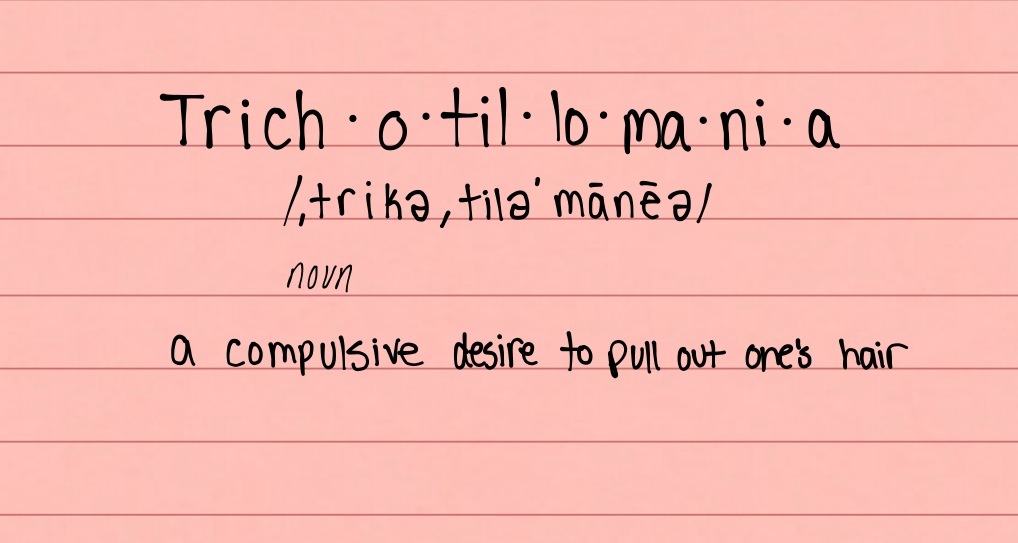I don't remember if anything had happened that day. Whether there was one big trigger or whether it was lots of little things. But that night, I laid in my bed and pulled and pulled and pulled my eyelashes out, literally nearly all of them. My eyes were sore but I was tired, and I was content when I fell asleep that night. It wasn't until the next day my lie begun. I didn't think any one would notice, but my family did. And that was when I said they must have fallen out.
I was 10, just a child. I thought that if I told my family what I'd done, I'd get told off, grounded, something taken away, whatever. That was how simple it was in my mind. And I decided that I wouldn't ever tell anyone my big secret. It would be something I would die with.
As my lie grew, I had to lie to professionals. I was taken for blood tests, specialist consultants, the works, each of them more baffled than the last as to why my lashes had fallen out. It was so scary, doing all these tests and being examined so much, when I knew the truth all along. But it had gotten so big now, that to tell the truth seemed even more worse.
I was diagnosed with alopecia aereta, a condition where only some of your body hair falls out. They said it had been brought on by stress. That second part is probably true, but I knew the diagnosis was wrong in my heart. And as a 10 year old, it became so difficult to carry on my shoulders. I didn't know if I was more ashamed of my lie or the fact that I was still pulling my lashes out consistently. Some days they'd all come out, others my hands were distracted enough not to pull too much.
When I was 21, I confessed.
I didn't know how to tell my family. My mental health had gotten so bad that I broke down. I'd researched my pulling and knew now that it had a name - trichotillomania. So I told my mum by showing her a Wikipedia page about it on my phone.

Trichotillomania, as defined by the NHS, is an impulse-control disorder where someone has the urge to pull their hair out. The most common places tend to be the hair on the head, eyelashes or eyebrows, but the urge can be to pull hair from anywhere. The individual has such a strong urge to pull the hair that they can become distressed if they're unable to, and after they do pull the hair, they feel a sense of relief.
There's different beliefs as to why people pull their hair out. Some say that it's a form of self-harm, others believe it is a form of OCD, and some suggest that it's an addiction. I personally think the reason is different dependant on the individual, and I would say that mine is linked to my OCD, however, I can't be certain on this.

It's hard to know how many people actually live with this condition, due to many sufferers feeling guilty, embarrassed and ashamed at their condition and therefore not wanting to 'come out' with it. The Guardian suggests it affects four in 100 individuals though. Whilst there are different treatments available, most research tends to suggest that sufferers will have the condition on and off for the rest of their life. Treatments tend to be therapies such as CBT and psychotherapy.
If you have trichotillomania, I urge you to speak out. It can be such a horrible and chronic condition to live with, and the secret of keeping it to yourself can often feel too heavy to keep to yourself. There IS support out there, and whilst it can be hard to talk about, coming 'clean' about my trich was one of the best things I've done. Now, when I've had a particularly bad episode of pulling, I can speak about it to my partner and know that it's okay.
If you know someone living with trich, be there to support them. It can be a very lonely condition and one they feel ashamed to speak about. If they feel self conscious, help them to see there are ways it can be managed such as through therapy or temporary solutions such as wigs and fake eyelashes. I've found liquid eye liner works a treat for filling gaps!
Thanks for reading my story, hopefully we can raise some more awareness about this condition.
AG -x-
Further Information
NHS Choices - Trichotillomania
The Trichotillomania Learning Center
Trichotillomania Support Online
OCD UK - Trichotillomania
Anxiety UK - Trichotillomania
No comments:
Post a Comment